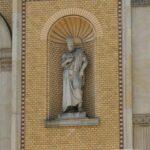As a seasoned IB writer, I’ve come to appreciate the vast landscape of knowledge that the International Baccalaureate program offers. Among these, the Theory of Knowledge (TOK) stands out as a cornerstone that challenges students to question the very basis of knowledge. In my path through the IB curriculum, it is an Area of Knowledge (AOK) that continues to intrigue me. So, let’s talk about the TOK AOK religious knowledge and highlight its nature and significance.
The Role of Religious Knowledge in TOK
The Religious Knowledge Systems (RKS) are recognized as one of the Areas of Knowledge (AOKs). This AOK digs into the nature, roles, and complexities of religious beliefs, practices, and knowledge systems across various cultures and societies. It examines how religious knowledge is constructed, communicated, and understood and its implications for individuals and societies. When studying RKS in TOK, students are encouraged to explore various questions and themes, such as:
- How do we define sacred or spiritual, and how does this affect our understanding of knowledge?
- How do religious beliefs influence our perception of reality and knowledge claims in other areas?
- How do religious knowledge systems coexist or conflict with other AOKs, such as natural or human sciences?
- What role do reason, emotion, and faith play in religious knowledge?
- How do we critically evaluate claims of religious knowledge while respecting cultural and individual beliefs?
Students may focus on RKS for their TOK essays or exhibitions, analyzing how religious knowledge interacts with the ways of knowing (WOKs) and comparing it with other AOKs. Such explorations require a thoughtful and respectful approach, recognizing the sensitivity of religious beliefs and the diversity of perspectives within and across religions.
So, religious knowledge in TOK offers students a profound opportunity to examine how religious beliefs and practices contribute to our understanding of the world. This AOK challenges students to consider the balance between subjective beliefs and objective knowledge, encouraging a deeper appreciation for the complexity and diversity of human understanding.
Key Components of Religious Knowledge AOK
In my view, this Area of Knowledge is constructed from several core components that form the rich texture of religious thought and practice across cultures and time. Here, I briefly overview these components, drawing on my extensive experience as an IB educator.
1. Myths
In my experience, myths are foundational narratives within religious traditions that offer profound insights into the human condition, cosmology, and the origins of customs and rituals. They serve as a crucial means societies pass down wisdom and values through generations. According to general IB criteria, understanding myths is essential for grasping the symbolic nature of religious language and how it conveys truths about existence, morality, and the divine. As I have observed, myths are not mere stories but vessels of profound philosophical and spiritual inquiry.
2. Rituals
From my standpoint, rituals are another component significantly shaping religious knowledge. These prescribed practices, ceremonies, or activities express and reinforce a religious community’s values and beliefs. In my observation, rituals often symbolize the beliefs described in myths, embodying them in actions that engage the community and individual in a deeply personal experience of the sacred. Understanding rituals, as per IB standards, allows students to appreciate the diverse ways humans connect with the divine and one another within the framework of their cultural and religious identities.
3. Symbols
Symbols, in my opinion, are the language of the soul. They are powerful tools that convey complex religious ideas in a visual or tangible form. Symbols encapsulate doctrinal truths, ethical ideals, and spiritual aspirations from the simplest objects to elaborate art. In my years of teaching, I’ve emphasized to students how symbols serve as bridges between the material and the spiritual, inviting deeper reflection on the mysteries they represent. According to IB criteria, analyzing religious symbols can unveil layers of meaning contributing to a fuller understanding of a religion’s core teachings.
4. Doctrines
Doctrines, as I know them, are the formalized beliefs and teachings that define a religious tradition’s theological and moral framework. They answer existential questions and ethical guidance, forming the bedrock of communal and individual faith. From my experience, engaging with doctrines challenges students to think critically about the nature of belief, the reasons for faith, and how religious teachings impact followers’ lives and worldviews. According to general IB criteria, doctrines encourage nuanced research of the interplay between reason, tradition, and spiritual insight in constructing religious knowledge.
By the way, in our blog, you can read more about other Areas of Knowledge:
- TOK AOKs: The Arts
- TOK AOKs: History
- TOK AOKs: The Human Sciences
- TOK AOKs: Mathematics
- TOK AOKs: The Natural Sciences
- TOK AOKs: Ethics
The Intersection of Religious Knowledge with Other AOKs
The fascinating intersection of religious knowledge with other AOKs is where I’ve spent considerable time reflecting and researching, both as an IB educator and a seasoned writer. From my experiences, I’ve observed that these intersections offer profound insights into the human condition, morality, and the evolution of societies:
- The melding of religious knowledge and ethics is particularly fascinating. Religious teachings often provide the moral frameworks that shape societal norms and individual behaviors, offering deep insights into the origins of our ethical convictions.
- The human sciences, including anthropology, psychology, and sociology, frequently tap into religious beliefs to understand societal dynamics and human behavior. This synergy reveals the profound impact of religion on social cohesion and identity.
- Historical analysis benefits immensely from an understanding of religious movements and beliefs. The role of religion in shaping significant events and cultural transformations provides a richer narrative of our past.
- Religious themes have inspired artistic expression across cultures, from architecture and painting to music and literature. This intersection showcases the profound spiritual and aesthetic dimensions of religious belief.
Considering these intersections, in my opinion, is a pathway to a deeper appreciation of the complex ways in which religious beliefs and practices influence, and are influenced by, other domains of knowledge. For instance, when we consider how religious doctrines have historically shaped ethical frameworks, we gain insights into the moral underpinnings of various cultures. Similarly, understanding the role of religion in human sciences improves our grasp of societal structures and behaviors.
How to Use Religious Knowledge AOK in TOK Essay?
By incorporating these tips, you can develop a nuanced and compelling exploration of religious knowledge in your TOK essay. Remember, the goal is to approach this AOK with an open mind and a critical eye, willing to grapple with complex questions about the nature and validity of knowledge.
Understand the Unique Nature of Religious Knowledge
In my view, the first step is to grasp the unique nature of religious knowledge. This AOK is distinct because it encompasses belief and faith, areas not easily explored through empirical evidence alone. From my experience, acknowledging this difference is crucial when crafting your TOK essay. It allows you to explore how religious knowledge contributes to our understanding of the world, respecting its unique epistemological basis.
Use Examples to Illustrate Points
As I know from guiding countless IB students, using specific real-life examples from religious traditions can significantly strengthen your arguments. Whether discussing ethical dilemmas, rituals, or the role of scripture, concrete examples help to ground your essay in real-world practices and beliefs. According to general IB criteria, examples should illustrate your point and demonstrate your understanding of the complexity and diversity of religious knowledge.
Analyze the Interplay with Other AOKs
From my experience, one of the most insightful aspects of working with religious knowledge in a TOK essay is analyzing its relationship with other Areas of Knowledge. For instance, you might examine how religious ethics interacts with the ethical considerations of natural sciences in the context of medical decisions. This approach showcases your ability to think critically about how different forms of knowledge interact and influence each other.
Reflect on the Implications of Religious Beliefs
Reflecting on the broader implications of religious beliefs for individuals and societies can add depth to your essay. It might involve considering how religious knowledge shapes cultural practices, influences personal identity, or contributes to societal norms. From what I’ve seen, essays that tackle these implications demonstrate a mature understanding of the role of knowledge in human life.

Need help with your IB TOK essay?
From research and analysis to structuring and editing, our skilled mentors will be by your side, helping you write an exceptional TOK essay that meets the word count and stringent IB criteria.
Critically Evaluate Sources of Religious Knowledge
Finally, critically evaluating the sources of religious knowledge is an essential skill in TOK. It could involve analyzing the role of authority in religious traditions, the interpretative nature of religious texts, or the subjective experience of faith. According to general IB criteria, demonstrating the ability to assess the foundations of religious knowledge can boost the quality of your TOK essay.
The Bottom Line
Reflecting on my experience with the IB program, I encourage students to approach the study of religious knowledge with curiosity and respect. In this way, you will not only gain insight into the beliefs of others but also deepen your understanding of the world and your place in it.
So, exploring TOK challenges us to think deeply, question freely, and appreciate the rich diversity of human beliefs and experiences. Knowledge is not just about acquiring facts but about understanding life. Also, remember that our IB experts are always ready to help you. For example, you can buy a TOK essay online at an affordable price.







